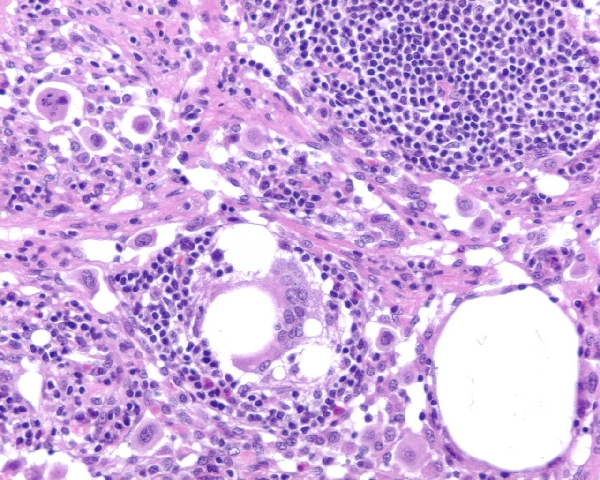Back to Program | 2010 Program and Abstracts Overview | 2010 Posters
Occult Retroperitoneal Lymphadenopathy from Metastatic Bladder Carcinoma Resulting in Duodenal Obstruction: Report of Two Cases
Brian Ang*1, Dana Yip1, Malca Kierson2, Tomer Davidov1, Christopher J. Gannon1
1Department of Surgery, UMDNJ-Robert Wood Johnson Medical School, New Brunswick, NJ; 2Department of Pathology, UMDNJ-Robert Wood Johnson Medical School, New Brunswick, NJ
Background: Duodenal obstruction has been reported to develop from direct extension of upper gastrointestinal malignancies, most commonly pancreatic, biliary, duodenal, and gastric cancers. Retroperitoneal lymphadenopathy is a rare cause of duodenal obstruction and typically occurs in the setting of lymphoma. Conventional cross-sectional and endoscopic interrogation are able to provide a diagnosis in the majority of cases.Findings: To our knowledge, this is the first report of two cases of duodenal obstruction resulting from confluent retroperitoneal lymphadenopathy at the level of the fourth portion of the duodenum from metastatic transitional cell carcinoma of the bladder. In both cases, there was confluent and firm retroperitoneal lymphadenopathy involving superior mesenteric artery lymph nodes causing extrinsic compression at the level of the fourth portion of the duodenum. CT scanning and upper endoscopy failed to recognize this pattern of confluent retroperitoneal lymphadenopathy from bladder carcinoma. Both patients underwent an exploratory laparotomy, requiring a surgical bypass for palliation. Conclusion: For patients with a known history of bladder carcinoma and evidence of duodenal obstruction, metastatic retroperitoneal lymphadenopathy should be entertained as a diagnosis, even in the face of equivocal radiographic imaging. Treatment options should be individualized for specific patients. Gastrojejunostomy can be considered for palliation in select cases.
Histopathology revealing poorly differentiated metastatic bladder carcinoma.
Back to Program | 2010 Program and Abstracts Overview | 2010 Posters



